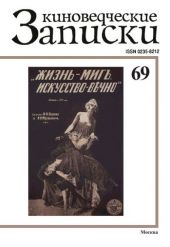 |
 |
PROCESS (I) XXVI MOSCOW INTERNATIONAL FILM FESTIVAL
Victoria LEVITOVA. The state of authorship. Analizing Russian films presented at XXVI Moscow International Film festival the author make some conclusions on the condition of cinema today, on metamorphosis and intersections of author and mass cinema. Svetlana ISHEVSKAYA. Marginalia about texts and times. Reflecting on some films of the festival program the author points out a reduce of cinematographers’ interest to play with form and a new turn of interest to a simple story, supposing on her way the decline of postmodernism epoch. Yulia ZAITSEVA. Fates people play. The article surveys the festival program «Studio» that included films not only about filmmakers (Tarkovsky, Fellini, Asta Nilsen) but also about writer Sergey Dovlatov and painter Gala. Alexandre KLUGE. «The most important in cinema you cannot see with eyes». The report of meeting in Cinema museum that took place during the festival with film critic Andrey Plahov, philosopher Boris Grois and the Cinema museum director Naum Kleiman. Natalia SAMUTINA. Alex van Warmerdam: a cinefil project. The author sums up her impressions on the past director’s retrospective, dealing with not only refined construction of his films but also with those traits of his films that make obvious today position of an intellectual spectator. IN MEMORIAM Georgii KNABE. On the background of epoch. In memory of Bahmutsky. Alexandre SOKUROV. He was the first and most important European in my life. Vladimir BAHMUTSKY. Screening Don Quixote. The block is dedicated to Vladimir Bahmutsky, one of the most respected and beloved professors in VGIK. EISENSTEIN READINGS «In state of true <…> prostration in the face of perfection of mastership», or It was enough for me “five minutes of Meyerhold”». Eisenstein’s notes on Meyerhold’s lectures. One of the most interesting periods in Eisenstein’s life was studying at Meyerhold’s studio (1921–1924). Later it was mystified by the director and his biographer I.A. Aksenov. Nevertheless Eisenstein’s notes on the Teacher’s lectures give us evidence of a very important phase of his professional formation. IN THE REALM OF CULTURE Oleg ARONSON. Cinema, Virginia Woolf and experience of time. Virginia WOOLF. Cinema. The author reflecting on the text by Virginia Woolf (which is published here in his interpretation) supposes that the writer finds out here specific traits of cinema, which where forgotten or even never noticed by other explorers.
PROCESS (II) «Unpopular genres». Round table talk in Russian Institute of fine art history. Saint-Petersburg, April, 2004. Dmitry SALYNSKY. Notes towards the genre problem in cinema. The block deals with such an astonishing problem in Russian cinema of our days as lack of genre films. Everybody knows that genre cinema is the most popular between filmmakers and in audience—everywhere, but not in Russia. Well-known Saint-Petersburg film explorers met and tried to discuss the theme. Dmitry Salynsky in his study points out instability and obscurity of cinema genre structure today. CINEMA MUSEUM Philip KAVENDISH. The hand that turns the handle: Camera operators and the poetics of camera in pre-revolutionary Russian films. The article seeks to chart the evolving nature of the camera operator’s function at a time when Russian cinema was facing the challenge of self-definition both in relation to the other art forms and to world cinema. Levitskiy’s and Zavelev’s shootings in films by Chardynin’s, Bauer’s illustrate and prove the thesis. EXPLORATION Yury ZHELYABUZHSKY. Mastership of Soviet cameramen. Study of development. Yury Zhelyabuzhsky (1888–1955), a cameraman, director and professor of VGIK, was a rather famous person in the history of Russian cinema. The study was prepared for publishing in 1948, but didn’t come out. In spite of the fact it is a memoirs it has an unquestionable historical value, as far as it is a unique attempt to explore experience of cameramen of early Russian cinema, some kind of subjective film history through the camera lens. FROM THE HISTORY OF FILM THOUGHT Osip Brik. Cinema critics of 20-es. Osip Brik (1888–1945) is well-known as a literary critic, constructivist and a close friend and biographer of Vladimir Mayakovsky. And his not widely known as a film critic and scriptwriter. In this issue we publish 24 articles by Brik which date from the 20-ies. It was the period of his active work in cinema, when he was in charge of script department of one of the leading film studios in Moscow, «Mezhrabpom-Rus» and wrote several scripts (in particular the «Chingiz-han’s Descendant»). ARCHIVES Valery GOLOVSKOY. Legend of Volga-Volga. The author sets forth a curios story of presenting Alexandrov’s film by Stalin to Franklin Roosevelt. THEME FOR EXPLORATION Agness VEVER. Variations on polyphonic universe by Alexei German. Chapters from VGIK degree thesis on the specific poetics in works of «My friend Ivan Lapshin» and «Khrustalev, my car!» author. |
|
 |
||||||||||||||||||||||||||||||||||||||||||||||||||||||||||||||||||||||||||||||||||||||||||||||||||||||||||||||||||||||||||||||||||||||||||||||
| « | » |
является незаконным.



